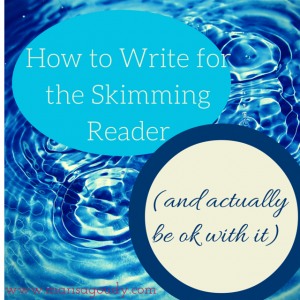How to Write for the Skimming Reader (and actually be ok with it)
Sovereign Standard, Issue 17 If you’re skimming this post, you’re “doing the internet” right. You’re granting this piece just enough attention to glean useful information. And, if it would be of interest to the people you wish to engage, you’ll share it with a brief comment that shows you’re paying attention to important things.
If you’re skimming this post, you’re “doing the internet” right. You’re granting this piece just enough attention to glean useful information. And, if it would be of interest to the people you wish to engage, you’ll share it with a brief comment that shows you’re paying attention to important things.
If, as a writer, I’ve done the internet right, you find it easy to breeze through these 1600 words. You get what you need, How to Write for the Skimming Reader (and actually be ok with it), and move on.
Headers help you navigate. Lists help to break the main ideas into bite sized portions. Bold passages show you when to pay attention.
 Yes, there are technical points to master - they matter (find more steps on doing that below). But you know there's more to writing a post that people care about than "just make it skimmable.”
Yes, there are technical points to master - they matter (find more steps on doing that below). But you know there's more to writing a post that people care about than "just make it skimmable.”
In order for something to read quickly and easily, you as the writer have to put in a heck of a lot of time and effort.
Does that sort of make you want to cry?
The internet really has changed how we read & think
You want to be available to your potential clients, customers, and readers, so you write content and post it online.
Even if their attention is scattered, it’s something, right?
The goal is to give people just enough in a blog post to engage their curiosity. Once you've intrigued them, they’ll invest their attention in a longer piece of your writing (a book either on their tablets or in print). When blogging is part of your content marketing strategy, you’re hoping that readers who got free content will soon spend money on your product or service.
You’re hoping that your readers have what Tufts University's Maryanne Wolf calls a “bi-literate brain.” They'll switch from a quick skim to an in-depth relationship with your work.
Professor Wolf researches the effects of this online skimming on our ability to read like we're "supposed to." Listen to this Note to Self podcast for assurance that you’re not alone if you feel like your brain works differently these days. Many are finding it hard to jump from speedy info consumption to contemplative, focused reading. (I'm just grateful I had to read Ulysses before the Web rewired my mind!)
In a Washington Post article, Wolf says:
We can’t turn back. We should be simultaneously reading to children from books, giving them print, helping them learn this slower mode, and at the same time steadily increasing their immersion into the technological, digital age. It’s both. We have to ask the question: What do we want to preserve?
Personally, I want to preserve that alchemical process of turning thought into written words that inspire a reader and change the world - even if many readers are just skipping through, looking for the quick news they can use.
How do you write when your reader's brain has been altered?
These sources don’t explore what it means to write with and for these new brains. As Note to Self says about what they found in the course of this episode:
It's another example of a phenomenon we see over and over again: If you feel like a device or any technology has messed with you, you might be onto something... way before any researcher can prove it.
The internet has messed with the way your readers engage with your content - now what?
[tweetthis]The internet has messed with the way your readers engage with your content - now what?[/tweetthis]
As a writer who lavishes her writing talents on screen-only material, this is how I cope with the reader who’s just skimming through:
- Accept that blogging is a bit like Zen sand art
- Write “good enough to be proud of” blog posts that meet my audience's expectations of an online reading experience
Blogging: an object lesson in impermanence
Blogging is an ephemeral art - and I believe it can and even should be an art, not just a perfunctory advertising technique.
Writing for the internet is a lesson in accepting the impermanent nature of life. Even posts that go viral get shunted off the front page eventually.
I think we can go further to say that blogging is also a spiritual practice. After all, blogging teaches you how to resist attachment. You simply cannot expect specific outcomes and end up feeling successful.
A blog is part of the business long game. There’s no guarantee that any post will bring in a dime. If there is an ROI, it’ll be cumulative and hard to trace to this one bit of writing. Instead, each post builds a relationship and takes a potential client that much closer to trusting you with their investment.
Most of the gifts of blogging come through the practice…
- The practice of writing each post gives you a chance to explore ideas as they occur to you. You can spend a few hours thinking deeply about how to communicate your thoughts into comprehensible messages. That sort of deep thought helps you maintain your bi-literate brain.
- The practice of maintaining a blog and writing over time gives you the chance to examine how your visions has grown and changed. You are able understand the relationships between your ideas and develop them into something more lasting like a book or a program.
A blog post is impermanent and they're just skimming it anyway - does it have to be perfect?
One of the first lessons in living without attachment I ever learned: let go of perfection. (As a writer who gets paid for typo-free prose, this was a hard one for me.)
Perfectionism really does equal paralysis. It also is responsible for business writing that never gets done and countless client relationships that never had a chance to get started.
So, “chuck perfect” as Karen Brody says.
Instead, focus on consistently creating material that is just good enough to stake your professional reputation on. Not every post needs to be a magnum opus. (Though keep in mind: you just never know when a particular passage is going to be your all important first impression.)
5 Features of a Good Enough to Be Proud of Blog Post
- Focused. The post is designed to convey one single, elegant idea. Take the pressure off yourself and the post itself by allowing it to perform a single simple task. Chances are, you can always get three posts out a single “ah ha!” moment. Dare to be brief or to go deep with one concept.
- Well-written: The post is as close to typo free as you can get after three read throughs. People can look past a few errors, but consistent oopses will erode your credibility. If you’re killing yourself to catch the missed words and you stress over every potential there/their/they’re humiliation, retain me as your writing coach and editor.
- Clear & organized: If your reader wants to skim, help them! Cut adjectives. Use small words and short sentences.Use headers that a clear rather than clever so your reader skip around as they please. Break ideas down into lists even if that offends your sensibilities as a “real” writer.
- Story-driven: The post is framed by a story or uses storytelling to convey main ideas. You use stories to give readers a taste of who you are, but also to engage yourself in the process. Stories breathe life into information. Don't lose yourself (and the reader) in your autobiography, but do allow your personality to shine through.
- Relevant: If the post is going to appear on your business blog, it has to relate to a product or service you offer or speak directly to the questions and concerns of your ideal client. Wrote a beautiful essay about seeing an eagle in flight or want to share your opinions on your favorite Netflix drama? That’s nice. Don’t blog it here. What you publish serves the mission of your business - to solve the problems of your customers and clients. If it doesn't, put it on your personal social media profile or submit it as a guest post someplace else.
But does it still hurt that you’re getting skimmed over?
No one has ever accused me of being particularly “zen” - at least not with a straight face. I strive to practice this non-attachment thing and ignore my stats and trust good content to make its own way (with some strategic social sharing, of course). Sometimes, however, it seems like we’re in a permanent state of imbalance - pouring all this exacting energy into writing something that people skim and consume rather than read.
People are turning to podcasting and YouTube for this very reason. I understand the attraction, but I still believe that it’s worth writing for your business - especially when you’re armed with the right mindset and understand that the rewards of writing may emerge far in the future.
Why it’s important to keep writing - and writing well - for the online readers
- You’re smart and literate. There’s a great chance that your ideal clients and customers are too, If you like to write, the person who thinks you’re perfect probably likes to read. That’s a good enough place to start - even if they’re "just" skimming your blog.
- Writing helps you think. It helps you discover new ideas and develop them from zygotic in the shower thoughts into big, beautiful visions that change lives.
- Though the human brain was not designed to read and write, we’ve been doing it for over 5000 years. I’m going to side with tradition on this one and conclude that we won’t stop reading in just one or two technology drenched generations
I’d love to help you contribute to the perpetuation of the English language. Oh, and help you communicate your ideas to your audience too. Here’s how I can help you as your writing coach.


